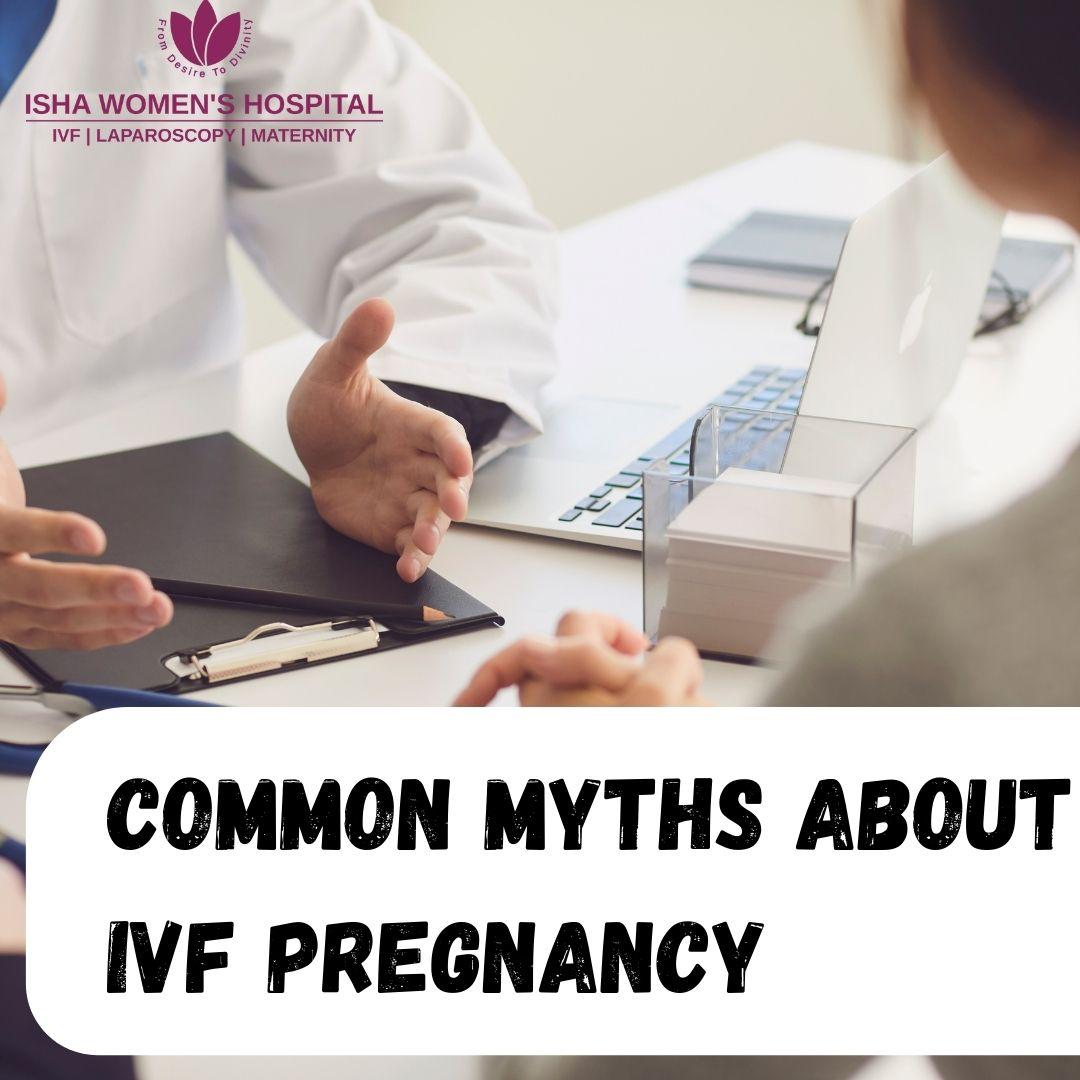Common Myths About IVF Pregnancy
 Are you considering IVF but worried about myths surrounding IVF pregnancies? Let’s bust the misconceptions and assure you that an IVF pregnancy is just as normal as a natural one. Isha Women's Hospital one of the best IVF center in palava, led by Dr Chinmay Pataki, the best gynecologist and fertility specialist in Thane, ensures that every patient feels confident and supported on their fertility journey.
Are you considering IVF but worried about myths surrounding IVF pregnancies? Let’s bust the misconceptions and assure you that an IVF pregnancy is just as normal as a natural one. Isha Women's Hospital one of the best IVF center in palava, led by Dr Chinmay Pataki, the best gynecologist and fertility specialist in Thane, ensures that every patient feels confident and supported on their fertility journey.
Myth 1: IVF Pregnancies Are Risky and Complicated
Fact: IVF pregnancies are no different from natural pregnancies. The only difference is the method of conception. Once the embryo implants successfully, the pregnancy follows the same course as any other. With expert care at Isha Women's Hospital, the best fertility centre in Kalyan-Dombivali, your pregnancy is in safe hands.
Myth 2: Babies Born Through IVF Are Not Normal
Fact: IVF babies are as normal and healthy as babies conceived naturally. There is no scientific evidence suggesting any increased risk of abnormalities. Advanced techniques and expert care by Dr Chinmay Pataki, the best gynecologist & fertility specialist in Thane district, ensure a smooth and successful pregnancy.
Myth 3: IVF Pregnancies Always Result in C-Sections
Fact: Many women who conceive through IVF have normal vaginal deliveries. The mode of delivery depends on the mother’s health and pregnancy conditions, not the method of conception. At Isha Women's Hospital, the best maternity hospital in Dombivali, the expert teams prioritize normal deliveries whenever possible.
Myth 4: IVF Leads to Multiple Pregnancies Only
Fact: While earlier IVF treatments had a higher chance of multiple pregnancies due to multiple embryo transfers, advancements in technology have made single embryo transfers (SET) common. With Dr Chinmay Pataki, the best IVF specialist in Kalyan-Dombivali, the focus is on healthy singleton pregnancies for the best maternal and fetal outcomes.
Myth 5: IVF Pregnancies Have More Health Issues
Fact: There is no difference between an IVF pregnancy and a natural pregnancy in terms of health risks, provided the mother receives proper medical care. With expert guidance from the best gynecologist in Palava, Dr Chinmay Pataki, your journey to motherhood will be safe and seamless.
Myth 6: IVF Babies Have Lower Intelligence or Developmental Issues
Fact: This is a completely false notion. Studies show that children born through IVF have normal cognitive and physical development. With expert fertility care at Isha Women's Hospital, the best fertility hospital in Thane, you can be assured that your baby will grow up just like any other child.
Myth 7: IVF Pregnancy Needs Extreme Bed Rest
Fact: IVF pregnancies do not require strict bed rest unless there is a specific medical condition. In fact, staying active is encouraged for a healthy pregnancy. At Isha Women's Hospital, the best IVF centre in Kalyan, Dr Chinmay Pataki with his expert team guides you on maintaining a balanced lifestyle for a smooth pregnancy journey.
Conclusion: IVF Pregnancy Is Completely Normal!
IVF is a scientifically proven, safe, and highly successful method of conception. Once pregnancy is confirmed, there is no difference between an IVF and a natural pregnancy. With Dr Chinmay Pataki, the best gynecologist and fertility expert in Kalyan-Dombivali, your journey to parenthood is in the best hands.
If you're planning for IVF and need expert guidance, visit Isha Women's Hospital – the best fertility centre in Thane. Your dream of parenthood is just a step away!
Frequently Asked Questions (FAQs)
1. Is IVF only for older women or those with infertility issues?
Answer: No. While IVF is commonly used for infertility, it is also recommended in various situations such as blocked fallopian tubes, male factor infertility, genetic disorders, or even for fertility preservation (egg/sperm freezing). Women of different ages may opt for IVF based on medical advice—not just older individuals.
2. Does IVF always result in twins or triplets?
Answer: Not necessarily. While multiple pregnancies were more common in earlier IVF methods due to multiple embryo transfers, today’s advancements and single embryo transfer (SET) protocols significantly reduce this risk. Fertility specialists aim to balance success rates with minimizing complications from multiple births.
3. Is IVF 100% successful?
Answer: No fertility treatment, including IVF, guarantees 100% success. IVF success rates depend on various factors like age, cause of infertility, embryo quality, and lifestyle. On average, the success rate ranges from 30% to 60% per cycle. Multiple cycles may be required for some couples.
4. Is IVF a painful or dangerous procedure?
Answer: IVF is generally safe and minimally invasive. While some discomfort may be experienced during hormone injections or egg retrieval, the procedures are well-tolerated. Serious complications are rare and are carefully managed by experienced fertility specialists.
5. Do babies born through IVF have health issues or abnormalities?
Answer: No, studies show that IVF babies are as healthy as those conceived naturally. While all pregnancies carry some risk, IVF itself does not increase the likelihood of congenital defects or developmental issues. IVF is a well-established and safe reproductive technology.

